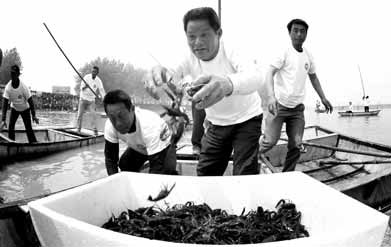Renowned for their high quality, crayfish from Xuyi county, Jiangsu province, continue to grow in popularity for their tight texture and thin shells.
The crayfish are the main ingredient of a popular spicy dish in China.
While the product's reputation has brought fortune to the local industry, it has also caused the emergence of knockoffs in other areas nationwide.
A court in Wuxi economic development zone recently pronounced the result of the country's first Xuyi crayfish trademark infringement case and ruled in favor of the plaintiff, Xuyi Crayfish Association, reported Legal Daily.
According to the verdict, the defendant, a hotpot restaurant in Wuxi city, has to pay 30,000 yuan ($4,878) to the association as compensation.
The association earlier found a signboard and posters hanging on the walls advertising so-called Xuyi crayfish, but the restaurant was not a member of the association.
The association registered the collective mark of Xuyi Crayfish in 2004, which has been recognized as a well-known trademark in China, and only the members of the association have the right to use it. The association now has more than 1,500 members.
The restaurant's owner argued that it was one of his friends who sold the crayfish. And the signboard and posters were used to help promote his friend's business. He did not provide any crayfish dishes in the restaurant.
An investigation discovered that the crayfish in question was in fact locally produced. Only the seasonings used to cook it were from Xuyi.
The court ruled that the signboard and posters would easily mislead consumers into believing the restaurant was part of the association, implying that the crayfish were genuine and met quality standards set by the trade organization.
The restaurant owner said that he had been to Xuyi and bought the posters there. But he did not understand why he could not use the signboard of Xuyi crayfish, because he believed it is just a combination of a place name and a generic name.
The judge told the newspaper that many shop and restaurant owners involved in such trademark dispute need to learn more knowledge about trademarks and geographical indications.
He also called for intensified publicity of trademark cases and encouraged more producers of agricultural and aquatic products to foster their own brands.
The association has also filed lawsuits against another eight Wuxi restaurants.
Zhao Jianmin, secretary of the association, said resorting to judicial procedures was "really upsetting", but it would be "more difficult to stop the infringement by filing complaints with the industrial and commercial administration".
He said the food safety accidents caused by fake Xuyi crayfish in recent years have not only caused great economic loss to local crayfish farmers but also damaged the reputation of the brand.
"We will continue to take legal actions to let more people enjoy the real Xuyi crayfish, which are delicious and safe," Zhao said.
Crayfish feeding and processing has become a pillar industry in Xuyi, with annual revenue of more than 2 billion yuan.
The county is home to China's only crayfish-themed museum. An international crayfish festival has been held annually since 2001, which usually kicks off in mid-June.
haonan@chinadaily.com.cn
|

Farmers of Xuyi county catch crayfish. Zhou Haijun / for China Daily
|
(China Daily 03/05/2014 page17)

